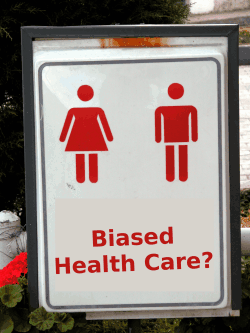Pain: Should Women be treated differently than Men?
Dr. Paul Spector, certified Health Fitness Specialist and director of Pantheon Medicine, wrote a fascinating article which appeared in the Huffington Post earlier this month (Women in Pain). In the article, he challenges the way that women with chronic pain are treated in the health field.
It’s the same old debate, in a way. We all want to see men and women treated “the same”, in the sense that they both get quality health care. On the other hand, getting “the same” treatment must mean that men and women are treated differently, simply because they’re physically different.
 |
Some of those differences are, of course, partly cultural. For example, men may be more reluctant to show weakness. Which means women are more open and more likely to tell their doctors about pain. Which could mean that women are perceived as “over-reacting” or “emotional”, when in reality they may just be coping better. Which means they may not be taken seriously.
Dr. Spector suggests four ways in which women are different:
- Women are more sensitive to pain than men
- Women have a higher prevalence of painful conditions than men
- Women seek medical help more often than men
- Women have received less pain medication than men and have had their condition discounted as psychogenic or emotional and therefore not worthy of treatment
Dr. Spector is actually responding to a discussion from the Centers for Disease Control and Prevention, the CDC Telebriefing on Deaths from Prescription Painkiller Overdoses Rise Sharply Among Women. In the discussion, Dr. Thomas R. Frieden (director of the CDC) suggests that, although men are more likely to die from an opioid overdose, the gap is narrowing.
What seems to be happening is that women are being prescribed more and more opioids (think methadone, codeine, hydrocodone, oxycodone, and meperidine).
Most of these deaths are not intentional – we’re not talking about an increase in suicides. Sometimes it would be an intentional overdose, or a mix of drugs or drugs and alcohol, etc, that would end in a death. There could also be situations when someone is sharing drugs with someone else.
From the standpoint of headache disorders, in the widespread problem of migraine disease women are more likely to have migraine. Both men and women can be stigmatized, there’s no doubt. But from a strictly anecdotal standpoint, it certainly seems like many women are written off and ignored in a way that I never have been.
Because of the prevalence of migraine in women, it does tend to be studied more than migraine in men. And that’s only natural.
But maybe there are problems with treatment for both genders – for different reasons and in different ways.
Do you feel that you’ve received poorer treatment because of your gender? How do you think doctors could do better? If you’re a doctor, what have you seen? What have you done to ensure that a woman or man with a headache disorder gets the treatment they need?

30 July 2013 @ 10:54 pm
Absolutely. Much like warnings of an impending heart attack, women’s symptoms are very different from that of a man…I would think it would be the same for migraines as well. Additionally, women are easily “dismissed” as it being “psychosomatic” in nature. I know this for a fact, as I know several men who have been treated successfully for migraines, where we are just “hormonal,” etc. I realize this is NOT the case across the board, and many people do receive good medical treatment. It’s just so difficult to find and be taken seriously. The end result is loss of quality of life.
31 July 2013 @ 2:23 am
ditto with everything Linda said!
31 July 2013 @ 5:45 pm
My fiancé and I both have migraines. His are chronic and severe. As a young male, he is usually seen as drug seeking, even though many opiates make it worse. He is often dismissed as being hungover even though he doesn’t ever take a sip of alcohol or that he is seeking attention. Not many take his migraines seriously. Watching his experiences, I find it hard to believe that women are treated any better or worse than he has been. Maybe different expectations and stigma, but I think just as many. in fact, I often feel that so much of the migraine conversation gets focused on women that he gets ignored. Certainly advertising is focused on women. Sometimes its almost as if it is considered a woman’s disease. I don’t know what more hoops he will have to jump through, but its pretty horrible on top of already having such immense chronic pain almost every day. Of course I am the one talking about his pain right now rather than him talking about it. So indeed phaps men aren’t getting the treatment they need but for different reasons. I am not saying women have it better by any means. Just saying…